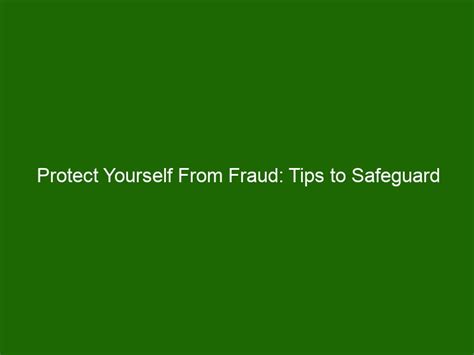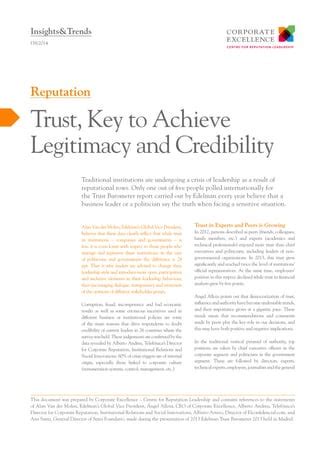In today's interconnected world, the rise of fraudulent activities targeting individuals' hard-earned savings has become an alarming reality. It is crucial for us to ensure the safety and security of our financial assets by staying informed and prepared against these deceitful strategies.
Every year, countless individuals find themselves entangled in scams that exploit their trust and vulnerability. These unscrupulous schemes prey on our desire for financial freedom, offering promises of quick riches and easy returns. However, behind these enticing prospects often lurk hidden dangers that can rob us of our money and peace of mind.
As responsible consumers, it is our duty to arm ourselves with knowledge and take proactive measures to identify and prevent financial scams. By recognizing the warning signs and learning from the experiences of others, we can safeguard our hard-earned money from falling into the hands of fraudsters.
Recognizing the Warning Signs: Common Tactics Used by Scammers

When it comes to protecting oneself from financial scams and fraudulent activities, it is essential to be knowledgeable about the common tactics used by scammers. By familiarizing yourself with these warning signs, you can better equip yourself to identify and avoid potential scams.
1. Phishing:
Scammers often use phishing techniques to trick individuals into revealing their personal and financial information. They may pose as legitimate organizations or individuals and send deceptive emails or messages, urging recipients to provide sensitive data such as bank account details or passwords.
2. High-pressure tactics:
Scammers frequently employ high-pressure tactics to create a sense of urgency and exploit their victims' emotions. They may claim that it's a "limited-time offer" or pressure you to make quick decisions without sufficient time for research or consideration.
3. Impersonation:
Impersonation is another common tactic used by scammers to gain trust and deceive their victims. They may pretend to be government officials, law enforcement officers, or professionals from reputable organizations to trick individuals into providing personal information or money.
4. Unsolicited communication:
Scammers often initiate contact without prior solicitation. They may call, email, or message you unexpectedly, offering enticing opportunities or financial deals that seem too good to be true. It is essential to be wary of unsolicited communication and verify the legitimacy of the source before disclosing any personal information or making financial commitments.
5. False promises and guarantees:
Scammers frequently make unrealistic promises and guarantees to lure individuals into their schemes. They may promise high returns on investments, instant wealth, or easy solutions to financial problems. Remember, if it sounds too good to be true, it probably is.
Being aware of these common tactics used by scammers can help you stay vigilant and protect yourself from falling victim to financial scams. Always remember to verify the legitimacy of any offers or requests before disclosing personal information or sending money.
Stay Informed: Staying on Top of the Latest Deceptions and Techniques
In order to safeguard your finances and protect yourself from potential scams, it is essential to arm yourself with knowledge and stay informed about the latest deceptive tactics employed by fraudsters. By staying up to date with the most recent scams and techniques, you can effectively identify red flags and take proactive measures to protect your hard-earned money.
Keeping abreast of the ever-evolving world of financial scams is no easy task, but there are several reliable sources that can help you stay informed. News websites, blogs, and forums dedicated to consumer protection are excellent resources to gather information and learn about the latest tricks used by scammers. Additionally, government agencies such as the Federal Trade Commission (FTC) and financial institutions often provide updates on emerging scams, warning signs, and prevention strategies.
It's crucial to understand that fraudsters continually adapt their approaches to exploit vulnerabilities in our increasingly interconnected world. They exploit technological advancements, societal trends, and human psychology to deceive unsuspecting individuals. Adhering to the saying "knowledge is power," you can equip yourself with the necessary tools to identify and avoid falling victim to their schemes.
One effective way to stay informed is to subscribe to email alerts or newsletters from reputable organizations dedicated to consumer protection. These subscriptions often include timely notifications about new scams, techniques, and preventative measures. By receiving regular updates and insights, you can stay one step ahead of fraudsters and make informed decisions about your financial well-being.
Another valuable resource is social media. Following reliable accounts and pages dedicated to fraud prevention can provide real-time updates on the latest scams making rounds in the digital landscape. Many organizations also leverage social media platforms to raise awareness and educate the public about common fraudulent practices, equipping you with the necessary information to protect yourself.
In conclusion, keeping up with the latest scams and techniques is an integral part of safeguarding your finances. By staying informed through reliable sources, subscribing to email alerts, and utilizing social media, you can enhance your knowledge and vigilance, ensuring you are well-equipped to identify and prevent financial scams.
Protecting Yourself: Vital Tips for Safeguarding Your Finances

As individuals, it is crucial to take proactive measures to safeguard our finances and protect ourselves from potential scams and fraudulent activities. By implementing a few essential strategies, we can significantly reduce the risk of falling victim to financial scams, ensuring our hard-earned money remains safe and secure.
1. Stay Vigilant and Informed: It is vital to stay alert and keep yourself updated on the latest scams and fraudulent practices that exist in the financial world. Regularly educate yourself about common scams, their techniques, and the warning signs to watch out for. This knowledge will empower you to recognize potential threats and take appropriate measures to protect your finances.
2. Practice Strong Password Management: In the digital age, strong password management is more critical than ever. Create unique, complex passwords for all your financial accounts and avoid using easily guessable information, such as your name or birthdate. Consider using a secure password manager to keep track of multiple passwords securely.
3. Exercise Caution with Online Transactions: When making online transactions, ensure you are using secure and reputable websites. Look for websites with "https" in the URL and a padlock symbol indicating a secure connection. Avoid sharing sensitive financial information over unsecured public Wi-Fi networks or through suspicious email requests.
4. Be Wary of Unsolicited Communication: Be cautious when receiving unsolicited phone calls, emails, or messages asking for personal or financial information. Legitimate organizations will never ask for such details via insecure channels. If in doubt, contact the organization directly using a verified contact number or email to verify the authenticity of the request.
5. Regularly Monitor Your Financial Accounts: Keep a close eye on your financial accounts, including bank statements, credit card bills, and online transaction history. Immediately report any suspicious activity or unauthorized transactions to your financial institution. The earlier you detect and address any fraudulent activity, the easier it will be to mitigate potential losses.
6. Invest in Reliable Security Software: Install reputable antivirus and anti-malware software on your devices to protect yourself from online threats. Regularly update the software to ensure it remains effective against the latest forms of malware and phishing attempts.
7. Seek Professional Advice: If you are unsure about a particular investment opportunity or financial decision, seek advice from a certified financial professional. They can provide guidance tailored to your specific circumstances and help you make informed choices to protect and grow your finances effectively.
By following these essential tips, you can strengthen your financial defenses, minimize the risk of falling for scams, and safeguard your hard-earned money. Remember, being proactive and staying informed are key to protecting yourself in an ever-evolving financial landscape.
Protecting Your Personal Information: Essential Measures for Online Security
Ensuring the safety of your personal information is of utmost importance in today's digital landscape. This section aims to provide you with best practices and strategies to safeguard your sensitive data while engaging in online activities. By following these guidelines, you can significantly reduce the risk of falling victim to identity theft, online scams, and unauthorized access to your financial details.
1. Strengthen Your Passwords:
- Create strong and unique passwords for all your online accounts.
- Avoid using easily guessable words or personal information in your passwords.
- Regularly update your passwords and refrain from reusing them across different platforms.
2. Enable Two-Factor Authentication:
- Opt for two-factor authentication whenever possible to add an extra layer of security.
- Enable this feature for your financial accounts and other critical online services.
- Ensure that the second factor is not easily accessible by others.
3. Exercise Caution with Personal Information:
- Think twice before sharing sensitive information online, especially on unfamiliar websites or through unsecured networks.
- Avoid providing personal details unless absolutely necessary and verify the legitimacy of the recipient.
- Regularly review privacy settings on social media platforms and limit the amount of personal information you share publicly.
4. Keep Software and Devices Updated:
- Install security updates and patches for your operating system, web browsers, and other software applications.
- Keep your antivirus software up to date and perform regular scans of your devices.
- Consider enabling automatic updates to ensure you have the latest security features.
5. Be Wary of Phishing Attempts:
- Stay vigilant against phishing emails, messages, and calls that impersonate legitimate organizations.
- Avoid clicking on suspicious links or providing personal information in response to unsolicited requests.
- Verify the authenticity of communications by contacting the organization directly using verified contact details.
By implementing these best practices, you can proactively protect your personal information and reduce the likelihood of falling prey to online threats. Remember, maintaining online security is an ongoing process that requires regular attention and awareness.
Trust No One: Verifying the Legitimacy of Financial Institutions and Companies

In a world filled with financial scams and fraudulent activities, it's crucial to take measures to protect your hard-earned money. One of the most effective ways to do so is by carefully verifying the legitimacy of financial institutions and companies before engaging with them.
Trust should never be given blindly, especially when it comes to financial matters. With the rise in online transactions and digital banking, it has become easier for scammers to create fake websites and companies that mimic legitimate ones, aiming to deceive unsuspecting individuals.
When interacting with any financial institution or company, it's essential to conduct thorough research to ensure they are legitimate and reputable. Start by checking if they are properly registered and licensed to operate in your jurisdiction. Look for official certifications or regulatory approvals that validate their credibility.
It's also crucial to verify the contact information provided by the institution or company. Authentic and trustworthy entities will have a physical address, a legitimate phone number, and a functional email address. Cross-check this information through independent sources, such as official directories or government websites, to ensure its accuracy.
Another effective method is to review and assess the online presence of the institution or company. Legitimate financial entities typically have well-established websites, complete with comprehensive information about their services, terms, and conditions, as well as privacy and security policies. Look for clear contact details and seek out customer reviews or testimonials to gauge the experiences of others.
Furthermore, it's advisable to consult reputable third-party sources or financial experts to gain insights and recommendations regarding the legitimacy of a particular institution or company. Educate yourself about common financial scams, their modus operandi, and red flags to watch out for. Stay updated with the latest news and alerts regarding potential fraudulent activities in the financial sector.
Lastly, always trust your instincts. If something feels too good to be true or raises suspicions, take a step back and reconsider your involvement. Communicate with trusted friends, family members, or financial advisors to seek their advice and perspective before making any significant financial decisions.
Remember, in the world of finance, it's better to be safe than sorry. By taking the necessary precautions and verifying the legitimacy of financial institutions and companies, you can protect yourself from falling victim to scams and ensure the security of your money.
Educating Others: Raising Awareness to Safeguard Against Fraudulent Schemes
In our interconnected world, it is of utmost importance to empower individuals with the knowledge and skills to protect themselves from financial scams and fraudulent activities. By sharing information and educating others, we can collectively work towards creating a society that is vigilant and well-informed.
Analyzing Investments: Red Flags to Look For and Conducting Due Diligence

In the world of investments, it is crucial to exercise caution and thorough examination before committing any funds. This section will explore the various warning signs, commonly known as "red flags," that investors should be aware of when assessing potential investment opportunities. Additionally, it will provide an overview of the due diligence process and the essential steps to take to ensure a well-informed investment decision.
Identifying Red Flags:
1. Unrealistic Returns: One of the most common red flags is a promise of abnormally high or guaranteed returns on investment. Such claims often indicate potential fraud or a risky investment that may not deliver as advertised. Investors should critically evaluate the feasibility and reasonableness of projected returns.
2. Lack of Transparency: Another red flag to be wary of is inadequate disclosure or lack of transparency regarding the investment opportunity. If key information, such as financial statements or the nature of the underlying assets, is not readily available or provided upon request, it should raise concerns about the legitimacy and trustworthiness of the investment.
3. Pressure Tactics: Scammers often employ high-pressure tactics to coerce investors into making hasty decisions. These tactics may include limited-time offers, aggressive sales pitches, or claims of exclusive opportunities. It is crucial to maintain a level-headed approach and not succumb to such manipulation.
4. Unregistered or Unlicensed Individuals/Companies: Verifying the credentials and legitimacy of the individuals or companies offering the investment is vital. Unregistered or unlicensed parties may operate outside the regulatory framework, increasing the risk of fraudulent activities or non-compliance with laws and regulations.
Note: These are just a few examples of red flags. It is essential to remain vigilant and trust one's instincts when assessing investment opportunities.
Conducting Due Diligence:
Due diligence is an essential process that helps investors gather relevant information and assess the risks involved in an investment. It involves thorough research and analysis to verify the claims made and assess the potential for future returns. Some crucial steps in conducting due diligence include:
1. Researching the Investment: Gather as much information as possible on the investment opportunity, including the company/individual offering it, historical performance, market trends, and competitor analysis.
2. Verifying Credentials: Verify the credentials, licenses, and registrations of the parties involved, including brokers, investment advisors, or companies. This can be done by checking with regulatory authorities or industry associations.
3. Conducting Background Checks: Perform background checks on key individuals associated with the investment. Look for any history of fraudulent activities, legal issues, or conflicts of interest that may raise concerns.
4. Financial Analysis: Analyze the financial statements, cash flow projections, and business plans of the investment opportunity. Look for any inconsistencies or irregularities that may indicate a potential scam or unsustainable business model.
5. Seeking Professional Advice: Consider consulting with professionals such as financial advisors, lawyers, or accountants who can provide expert guidance and help in evaluating the investment.
By being aware of red flags and conducting thorough due diligence, investors can significantly reduce the risk of falling victim to financial scams and make informed investment decisions.
Common Scams to Be Cautious Of: Ponzi Schemes, Phishing, and Identity Theft
Within the realm of financial security, it is crucial to remain vigilant against various fraudulent activities that can put your hard-earned wealth at risk. This section sheds light on some of the most prevalent scams: Ponzi schemes, phishing attacks, and identity theft. Familiarizing yourself with these tactics will help you recognize potential threats and take necessary precautions.
| Scam Type | Description | Prevention Tips |
|---|---|---|
| Ponzi Schemes | Ponzi schemes entice individuals with promises of high returns on investments, where new investors' funds are used to pay off earlier investors. However, the scheme's sustainability relies solely on recruiting new participants. Eventually, the scheme collapses, resulting in financial losses for the majority. |
|
| Phishing Attacks | Phishing is a deceitful technique employed by cybercriminals to obtain sensitive information, such as login credentials, credit card details, or social security numbers. They often disguise themselves as legitimate entities via emails, text messages, or websites. |
|
| Identity Theft | Identity theft occurs when someone unlawfully accesses and utilizes another person's personal information for fraudulent purposes. This can lead to financial losses, as the thief may open new accounts, apply for loans, or make purchases using the victim's identity. |
|
By being aware of these common scams and taking necessary precautions, you can minimize the risk of falling victim to financial fraud. Remember, staying informed and cautious is the key to protecting your financial well-being.
Steps to Take If You Become a Victim: Reporting Scams and Recovering Your Funds

Once you discover that you have fallen victim to a financial scam, it is crucial to take immediate action to minimize the damage and increase the chances of recovering your money. Reporting the scam to the appropriate authorities is an essential first step in holding the scammers accountable and preventing them from defrauding others in the future.
Here are the steps to follow if you find yourself in the unfortunate situation of being scammed:
- Document the details: Start by gathering all the relevant information about the scam, such as the dates, individuals involved, communication records, and any supporting documentation. Take screenshots or save copies of emails, text messages, and any other evidence that could be useful in building your case.
- Contact law enforcement agencies: File a report with your local police department or the appropriate authority responsible for handling financial fraud cases. Be prepared to provide them with all the gathered information and cooperate fully during the investigation process.
- Notify your financial institution: Inform your bank, credit card company, or any other financial institution that may be involved in the scam. They can assist you in monitoring your accounts, freezing funds, and taking necessary steps to prevent further unauthorized transactions.
- Report the scam to relevant authorities: In addition to the local police, report the scam to government agencies such as the Federal Trade Commission (FTC) or the Securities and Exchange Commission (SEC). These agencies have resources and expertise in dealing with various types of financial scams and can provide valuable guidance.
- Warn others: Share your experience and knowledge about the scam, both online and offline, to raise awareness and potentially help others avoid falling into the same trap. Social media platforms, community forums, and online scam reporting websites are effective channels to spread the word.
- Seek legal advice: If the scam involves significant financial losses, consider consulting with an attorney who specializes in fraud cases. They can guide you through the legal process, provide advice on recovering your money, and represent your interests if necessary.
- Monitor your credit: Keep a close eye on your credit reports and consider placing a fraud alert or freeze on your credit files. This can help prevent the scammers from further exploiting your stolen personal information for fraudulent purposes.
- Explore recovery options: Depending on the nature of the scam, there might be potential avenues for recovering some or all of your lost funds. Consult with relevant authorities, legal professionals, or reputable consumer protection organizations to explore any available options for restitution.
Remember, acting swiftly and effectively is crucial when dealing with financial scams. By promptly reporting the scam, cooperating with law enforcement, and taking steps to protect yourself and others, you increase the likelihood of recovering your money and preventing similar scams from affecting more innocent victims.
Seeking Legal Assistance: When and How to Seek Professional Help in Dealing with Financial Fraud
In the pursuit of safeguarding one's assets and finances, it is imperative to be aware of the potential threats posed by various fraudulent activities. Dealing with financial scams can be overwhelming and navigating the legal complexities surrounding such scams can be challenging for individuals without legal expertise. This section aims to guide individuals in understanding the importance of seeking legal assistance and provides insights into when and how to find professional help for effectively addressing financial scams.
Identifying the Need for Legal Help
When confronted with a potential financial scam, recognizing the need for legal assistance becomes vital for protecting one's interests. Entrusting the expertise of legal professionals can provide valuable insights into the legal frameworks relevant to the specific scam and help individuals understand their rights and options. Seeking legal help is particularly important when individuals encounter complex financial schemes, face difficulties in recovering lost funds, or require guidance in navigating the legal process.
Finding the Right Legal Support
Once the need for legal help is established, finding the right assistance becomes crucial for effectively dealing with financial scams. Engaging the services of an experienced attorney specializing in fraud-related matters can significantly increase the chances of a successful resolution. To locate the right legal support, individuals can consider seeking recommendations from trusted sources, such as friends, family, or professionals in the field. Additionally, online directories and legal referral services can help connect individuals with qualified attorneys.
Collaborating with Legal Professionals
Collaborating with legal professionals ensures a comprehensive approach to addressing financial scams. Working closely with attorneys allows individuals to gather and provide necessary evidence, present their case effectively, and understand the potential remedies available. Legal experts can guide individuals through negotiation, mediation, or litigation processes, ensuring that their rights are protected and appropriate legal actions are taken against the perpetrators of financial scams.
Costs and Legal Aid
It is crucial to consider the financial aspects associated with seeking legal assistance. The cost of legal representation can vary based on the complexity of the case and the expertise of the attorney. Individuals should discuss the fee structure, potential additional expenses, and available payment options with attorneys to have a clear understanding of the financial implications. For those facing financial constraints, exploring options such as legal aid services, pro bono representation, or contingency fee arrangements can be beneficial.
Conclusion
When caught in the web of financial scams, seeking legal help is a crucial step towards reclaiming lost assets and safeguarding one's financial future. By recognizing the need for legal assistance, finding the right legal support, and collaborating effectively with legal professionals, individuals can navigate through the complexities of financial fraud and increase their chances of obtaining a just resolution.
FAQ
What are some common signs that indicate a possible financial scam?
There are several common signs that may indicate a financial scam, such as unsolicited phone calls or emails from unknown individuals or companies, requests for personal or financial information, promises of high returns with little or no risk, and pressure to act quickly or keep information confidential.
How can I protect myself from financial scams?
To protect yourself from financial scams, it is important to be cautious and skeptical of unsolicited communications, never share personal or financial information with unknown individuals or companies, research and verify the legitimacy of any investment opportunities, regularly monitor your financial accounts, and report any suspicious activities to the appropriate authorities.
What should I do if I believe I have been a victim of a financial scam?
If you believe you have been a victim of a financial scam, it is crucial to act quickly. First, report the incident to your local law enforcement agency and provide them with all the relevant details. Then, contact your bank or credit card company to freeze or close any affected accounts. Additionally, consider filing a complaint with your country's consumer protection agency or financial regulatory authority.
Are there any resources available to help individuals learn more about financial scams?
Yes, there are several resources available to help individuals learn more about financial scams. You can visit websites of government agencies, such as the Federal Trade Commission (FTC) or the Securities and Exchange Commission (SEC), to access educational materials, scam alerts, and information on how to spot and report financial scams. There are also non-profit organizations and consumer advocacy groups that provide educational resources and support for scam victims.
How can I educate my elderly family members about financial scams?
Educating elderly family members about financial scams is crucial to protect them from falling victim. Start by having open and honest conversations about the potential risks and warning signs of scams. Encourage them to be cautious and skeptical of unsolicited communications, assist them in setting up security measures like strong passwords and two-factor authentication, and consider helping them manage their financial accounts to monitor for any suspicious activities.
What are the most common types of financial scams?
The most common types of financial scams include phishing scams, pyramid schemes, fake investment opportunities, identity theft, and romance scams.
How can I protect myself from financial scams?
To protect yourself from financial scams, you should be cautious of suspicious phone calls or emails, never share your personal or financial information with unknown individuals or organizations, regularly monitor your bank accounts and credit reports, and educate yourself about different types of scams.



